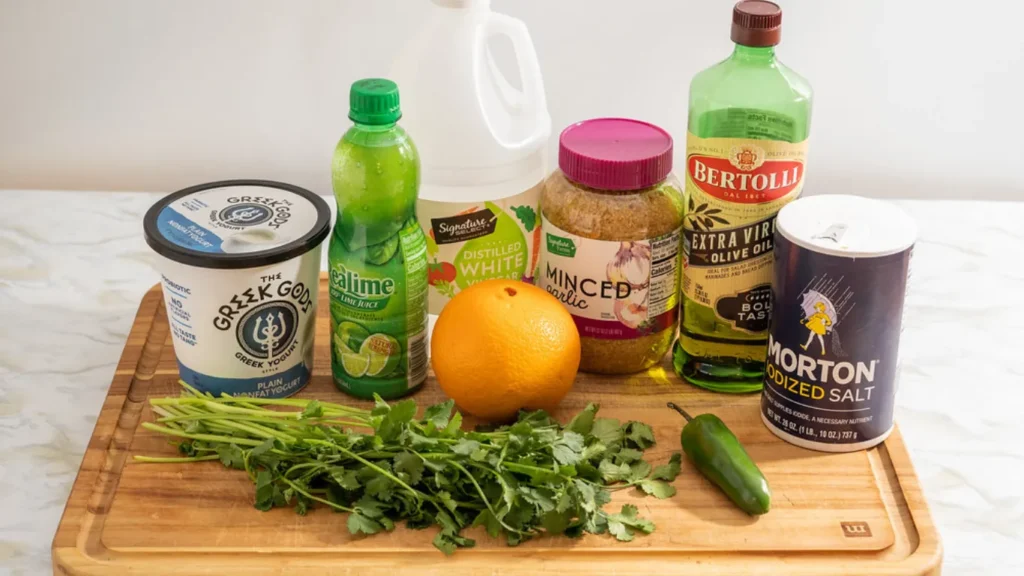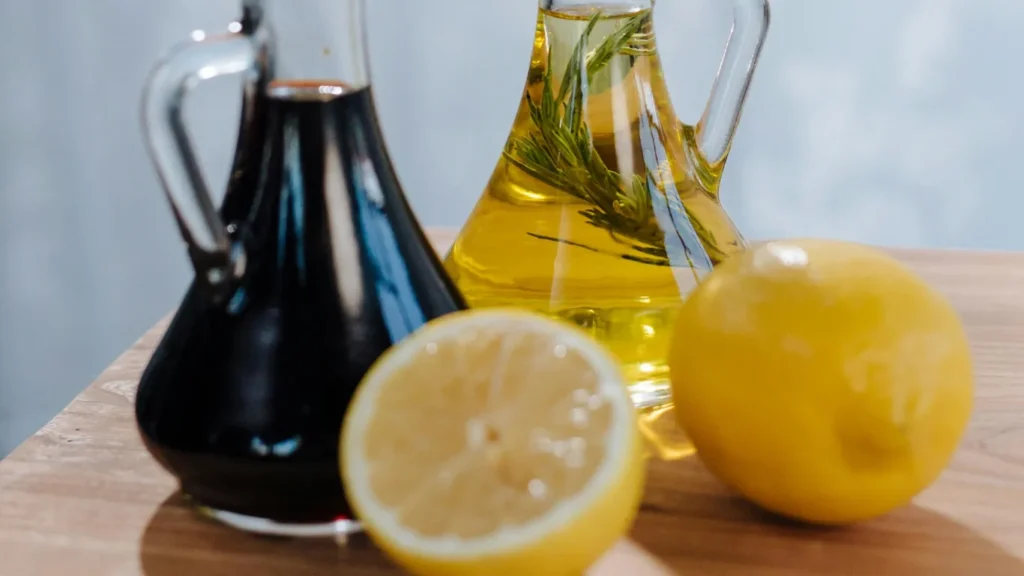Discover the ultimate lemon vinaigrette dressing recipe, its health benefits, variations, and how to make it easily at home. Elevate your salads, veggies, and grilled dishes with this fresh, tangy dressing!
When it comes to adding a burst of freshness and brightness to any dish, few things can compete with a perfectly balanced lemon vinaigrette dressing. Whether you’re tossing it over a crisp garden salad, drizzling it on roasted vegetables, or marinating chicken or fish, this simple yet flavorful dressing can transform ordinary meals into extraordinary culinary experiences.

In this post, you’ll learn everything about lemon vinaigrette dressing—what it is, its health benefits, easy recipes, pro tips, variations, storage advice, and some clever ways to use it beyond just salads. Get ready to make this versatile dressing your new kitchen staple!
What is Lemon Vinaigrette Dressing?
Lemon vinaigrette dressing is a classic, tangy-sweet dressing made primarily with lemon juice, olive oil, and simple seasonings. Known for its bright citrusy flavor, it strikes the perfect balance between acidity and richness.
A traditional vinaigrette generally consists of three main components:
- Acid – In this case, freshly squeezed lemon juice.
- Oil – Usually extra virgin olive oil.
- Emulsifier & Flavorings – Like Dijon mustard, garlic, salt, pepper, and sometimes honey or maple syrup for sweetness.
This dressing is naturally gluten-free, dairy-free, and can be customized to fit vegan, keto, or paleo diets.
Health Benefits of Lemon Vinaigrette Dressing
Apart from its delicious flavor, lemon vinaigrette offers several health perks:
1. Rich in Antioxidants:
Lemon juice contains vitamin C, a potent antioxidant that boosts immunity and fights free radicals.
One of the standout health benefits of lemon vinaigrette dressing is its high antioxidant content. Both lemon juice and extra virgin olive oil are natural sources of powerful antioxidants that can protect your body from oxidative stress and free radical damage.
Lemon Juice: A Vitamin C Powerhouse
Freshly squeezed lemon juice is packed with vitamin C, an essential antioxidant that plays a crucial role in boosting the immune system, promoting collagen production for healthy skin, and supporting overall cellular health. Vitamin C also helps reduce inflammation and can lower the risk of chronic diseases like heart disease and certain cancers.
Extra Virgin Olive Oil: Liquid Gold for Your Heart
Extra virgin olive oil contains polyphenols, such as oleocanthal and oleuropein, which are known for their strong antioxidant and anti-inflammatory properties. These compounds help protect blood vessels, reduce bad cholesterol levels (LDL), and improve heart health. Regular consumption of olive oil has been linked to a lower risk of cardiovascular diseases and age-related cognitive decline.
A Natural Shield Against Disease
The antioxidants in lemon vinaigrette not only combat free radicals but also contribute to slowing the aging process, maintaining glowing skin, and preventing cell damage that could lead to illnesses over time. Incorporating this simple dressing into your daily meals is an effortless way to nourish your body while enhancing the flavor of your dishes.
2. Heart-Healthy Fats:
Extra virgin olive oil is full of monounsaturated fats that promote heart health by reducing bad cholesterol.
One of the key reasons why lemon vinaigrette dressing is a nutritious choice lies in its rich content of heart-healthy fats, primarily derived from extra virgin olive oil. These beneficial fats are essential for maintaining cardiovascular health and supporting overall well-being.
Extra Virgin Olive Oil: A Source of Good Fats
The main fat in extra virgin olive oil is monounsaturated fat, a type of dietary fat known for its positive effects on heart health. Monounsaturated fats have been shown to help:
- Lower LDL (bad) cholesterol levels, which reduces the risk of plaque buildup in arteries.
- Increase HDL (good) cholesterol, offering protective benefits for the heart.
- Reduce blood pressure and inflammation, key contributors to heart disease.

Numerous studies, including those focusing on the Mediterranean diet, highlight the cardiovascular benefits of regular olive oil consumption, linking it to a decreased risk of stroke and heart attack.
Why Healthy Fats Matter
Incorporating healthy fats like those found in olive oil supports the body’s ability to absorb fat-soluble vitamins such as A, D, E, and K. These nutrients are vital for maintaining strong bones, immune function, and skin health.
Additionally, healthy fats contribute to a feeling of fullness and satisfaction after meals, which can help with weight management—a critical factor in maintaining heart health.
Better Than Processed Alternatives
Unlike store-bought dressings that may contain unhealthy trans fats or highly processed oils, homemade lemon vinaigrette dressing made with quality extra virgin olive oil delivers pure, unrefined fats that nourish the body without harmful additives.
3. Aids Digestion:
Lemon stimulates bile production in the liver, helping with digestion and nutrient absorption.
Another valuable benefit of lemon vinaigrette dressing is its natural ability to support and improve digestion. The two star ingredients—fresh lemon juice and extra virgin olive oil—both contribute to a healthier, more efficient digestive system.
Lemon Juice: A Natural Digestive Booster
Lemon juice is rich in citric acid, which can stimulate the production of digestive enzymes in the stomach. These enzymes help break down food more efficiently, allowing for better nutrient absorption. Starting your meal with a salad dressed in lemon vinaigrette can kick-start your digestion and prevent issues like bloating, indigestion, and gas.
In addition, lemon’s natural acidity encourages the liver to produce bile, a fluid that aids in digesting fats. Enhanced bile flow can lead to smoother digestion of fatty meals and contribute to overall gut health.
Olive Oil: Gentle on the Stomach
Extra virgin olive oil acts as a mild lubricant in the digestive tract, helping food move more smoothly through the intestines. This can prevent common digestive problems such as constipation and discomfort. Olive oil also has anti-inflammatory properties, which can soothe the gut lining and promote a healthier digestive environment.
A Simple Way to Improve Gut Health
Incorporating lemon vinaigrette into your meals is an easy, natural way to support a well-functioning digestive system. Unlike heavy, creamy dressings that may slow digestion or cause discomfort, this light and zesty dressing leaves you feeling satisfied without the heaviness.
4. Low in Calories:

Homemade lemon vinaigrette is significantly lower in calories and sugar compared to store-bought dressings loaded with preservatives and additives.
One of the standout features of lemon vinaigrette dressing is that it’s naturally low in calories, making it an ideal choice for anyone mindful of their calorie intake or looking to maintain a healthy weight without sacrificing flavor.
A Guilt-Free Flavor Enhancer
Unlike creamy store-bought dressings—such as ranch, Caesar, or blue cheese—which can add 100–200 hidden calories per serving, a homemade lemon vinaigrette typically contains only 60–80 calories per tablespoon. Most of these calories come from the healthy fats in extra virgin olive oil, which provide energy and essential nutrients without the harmful additives or sugars found in many processed dressings.
No Hidden Sugars or Preservatives
Commercial salad dressings are often loaded with refined sugars, artificial flavorings, and preservatives that not only increase the calorie count but also offer little to no nutritional value. With a homemade lemon vinaigrette, you control every ingredient, keeping the dressing clean, fresh, and light.
Perfect for Weight Management
Because lemon vinaigrette is low in calories but high in flavor, it allows you to enjoy salads, grain bowls, and grilled vegetables without adding excess calories. This makes it a fantastic option for those following weight-loss plans, low-calorie diets, or simply wanting to eat more mindfully.
5. Anti-Inflammatory Properties:

Olive oil contains compounds that reduce inflammation in the body, contributing to better overall health.
In addition to being fresh and flavorful, lemon vinaigrette dressing offers impressive anti-inflammatory benefits, making it not just a tasty addition to your meals but also a health-boosting one.
Olive Oil: Nature’s Anti-Inflammatory Superfood
The primary fat source in lemon vinaigrette—extra virgin olive oil—is packed with polyphenols, especially oleocanthal, a compound scientifically proven to reduce inflammation in the body. This natural substance works similarly to non-steroidal anti-inflammatory drugs (NSAIDs) by inhibiting inflammatory enzymes, potentially lowering the risk of chronic diseases such as arthritis, heart disease, and even some cancers.
Studies of the Mediterranean diet, rich in olive oil, show that regular consumption is associated with reduced markers of inflammation and better long-term health outcomes.
Lemon Juice: Boosting Immunity and Reducing Oxidative Stress
Fresh lemon juice contributes its own anti-inflammatory powers through its high vitamin C content. This potent antioxidant fights oxidative stress—one of the main causes of chronic inflammation in the body. By reducing free radicals, lemon juice supports your immune system and may help alleviate inflammation-related conditions like joint pain and skin issues.
A Natural Way to Fight Inflammation
Unlike processed dressings loaded with sugars, unhealthy fats, and artificial additives—which can actually promote inflammation—homemade lemon vinaigrette dressing nourishes your body while helping to calm inflammation naturally. Incorporating this dressing into your daily diet is a simple step toward supporting overall wellness and reducing your risk of inflammatory diseases.
How to Make Classic Lemon Vinaigrette Dressing (Quick Recipe)
Making lemon vinaigrette at home is surprisingly easy. Here’s a basic recipe:
Ingredients:
- ¼ cup fresh lemon juice (about 2 lemons)
- ½ cup extra virgin olive oil
- 1 teaspoon Dijon mustard (acts as an emulsifier)
- 1 teaspoon honey or maple syrup (optional, for a touch of sweetness)
- 1 small garlic clove, minced
- ½ teaspoon sea salt (or to taste)
- ¼ teaspoon black pepper (freshly ground)
Instructions:
- In a small bowl or mason jar, combine lemon juice, Dijon mustard, honey (if using), garlic, salt, and pepper.
- Slowly drizzle in the olive oil while whisking continuously (or shake the jar vigorously) until the dressing emulsifies and becomes creamy.
- Taste and adjust seasoning as needed.
- Store in an airtight jar in the fridge for up to 1 week. Shake well before each use.
Pro Tips for the Perfect Lemon Vinaigrette
- Use Fresh Lemons: Bottled lemon juice lacks the bright, fresh flavor of real lemons.
- Balance Acidity: If the dressing tastes too tangy, add a bit more olive oil or a teaspoon of honey to mellow it.
- Emulsify Properly: Dijon mustard helps keep the oil and lemon juice combined instead of separating.
- Season Generously: Salt brings out the flavors; don’t skimp!
- Add Herbs: Fresh chopped basil, parsley, dill, or thyme can take your vinaigrette to another level.
Flavor Variations to Try
Lemon vinaigrette is endlessly customizable. Here are some delicious variations:
1. Herbed Lemon Vinaigrette:
Add 2 tablespoons of finely chopped fresh herbs such as parsley, cilantro, or mint.
For an extra layer of freshness and flavor, try making a Herbed Lemon Vinaigrette—a delightful twist on the classic recipe that incorporates aromatic herbs to elevate both taste and nutrition. This variation is perfect for spring and summer salads, roasted vegetables, grilled meats, and even as a dip for fresh bread.
Why Add Herbs?
Fresh herbs not only add depth of flavor but also pack powerful health benefits. Many herbs like parsley, basil, dill, and mint are rich in vitamins, minerals, and antioxidants that contribute to improved digestion, reduced inflammation, and overall well-being.
2. Lemon Garlic Vinaigrette:
Double the garlic for an extra punch, or roast the garlic first for a sweet, mellow flavor.
For those who love bold, savory flavors, the Lemon Garlic Vinaigrette is a must-try variation. Combining the zesty brightness of lemon juice with the aromatic warmth of fresh garlic, this dressing adds depth and intensity to any dish, making it perfect for salads, roasted vegetables, and marinades.
Why Garlic?
Garlic is not just a flavor powerhouse—it also boasts impressive health benefits. Rich in compounds like allicin, garlic provides antimicrobial, antioxidant, and anti-inflammatory properties that can boost immunity and support heart health. Adding garlic to your vinaigrette enhances both taste and nutrition.
3. Lemon Honey Mustard Vinaigrette:
Use 1 tablespoon of honey and 2 teaspoons of Dijon mustard for a sweeter, creamier version.
If you’re looking for a perfectly balanced dressing that’s tangy, sweet, and slightly sharp, then the Lemon Honey Mustard Vinaigrette is your go-to variation. This versatile dressing combines the bright citrus flavor of lemon with the smooth sweetness of honey and the creamy, zesty kick of Dijon mustard—ideal for both savory and sweet-leaning salads.
Why Add Honey and Mustard?
- Honey (or maple syrup) adds a touch of natural sweetness that softens the acidity of lemon juice, creating a smooth, pleasing taste that even picky eaters will enjoy.
- Dijon Mustard not only brings a subtle heat and complexity but also acts as an emulsifier, helping the oil and lemon juice blend into a creamy, stable dressing.
4. Spicy Lemon Vinaigrette:
Add ¼ teaspoon crushed red pepper flakes or a dash of hot sauce.
For those who love a little heat in their meals, the Spicy Lemon Vinaigrette is the perfect variation to wake up your taste buds. This zesty dressing brings together the bright, tangy flavor of lemon juice with a bold kick of spice, making it an excellent choice for salads, grain bowls, roasted vegetables, and grilled meats.
Why Add Spice?
Adding spice to your lemon vinaigrette not only enhances flavor but also offers metabolic benefits. Spicy ingredients like crushed red pepper flakes, fresh chili, or a dash of hot sauce contain compounds such as capsaicin, known for boosting metabolism, improving digestion, and even reducing appetite
5. Lemon Tahini Vinaigrette:
Whisk in 1 tablespoon of tahini for a nutty, creamy texture perfect for Mediterranean dishes.
For a creamy, nutty twist on the classic, try this delicious Lemon Tahini Vinaigrette. Blending the bright acidity of lemon juice with the rich, earthy flavor of tahini creates a smooth, luscious dressing that’s perfect for Mediterranean and Middle Eastern-inspired dishes.
Why Add Tahini?
Tahini (ground sesame seed paste) is packed with healthy fats, protein, and essential minerals like calcium, magnesium, and iron. It adds not only creaminess but also nutritional value to the vinaigrette—making the dressing satisfying, vegan-friendly, and dairy-free without using cream or cheese.
Creative Ways to Use Lemon Vinaigrette Dressing
Don’t limit this fantastic dressing to just salads! Here are some creative ways to use lemon vinaigrette:
1. Marinade for Grilled Chicken or Fish:
Its acidity helps tenderize protein while infusing it with zesty flavor.
One of the most versatile ways to use lemon vinaigrette dressing is as a flavorful marinade for grilled chicken or fish. Thanks to its perfect balance of acidity, fat, and seasonings, this vinaigrette helps tenderize proteins while infusing them with fresh, zesty flavor.
Why Lemon Vinaigrette Works as a Marinade
- Lemon Juice: The natural acidity of lemon juice breaks down the fibers in chicken or fish, resulting in a tender, juicy texture.
- Olive Oil: Acts as a carrier, allowing the herbs, garlic, and spices to penetrate deeply into the protein.
- Seasonings: Garlic, Dijon mustard, and optional herbs add aromatic complexity, enhancing the natural taste of the meat or fish without overpowering it.
2. Roasted Vegetables:
Toss warm roasted veggies like broccoli, asparagus, or Brussels sprouts in lemon vinaigrette for a bright finish.
One of the simplest yet most flavorful ways to enjoy lemon vinaigrette dressing is by pairing it with roasted vegetables. A drizzle of this bright, zesty dressing can completely transform roasted veggies from a basic side dish into a mouthwatering, vibrant addition to any meal.
Why Lemon Vinaigrette is Perfect for Roasted Vegetables
- Enhances Natural Sweetness: Roasting vegetables brings out their natural sugars, creating a caramelized, slightly sweet flavor. The acidity of lemon vinaigrette perfectly balances this sweetness, adding brightness and depth.
- Adds Freshness: After roasting, a light drizzle of vinaigrette cuts through the richness, making the vegetables taste fresh and lively.
- Boosts Nutrition: The healthy fats from olive oil in the vinaigrette help your body absorb fat-soluble vitamins (A, D, E, K) present in the vegetables.
3. Grain Bowls:
Drizzle over quinoa, farro, or couscous bowls packed with veggies for a light and satisfying meal.
One of the trendiest and healthiest ways to enjoy lemon vinaigrette dressing is by using it as the finishing touch on grain bowls. Whether you prefer quinoa, farro, brown rice, or couscous as your base, a drizzle of lemon vinaigrette ties all the ingredients together, adding a fresh, tangy burst of flavor that elevates the entire dish.
Why Lemon Vinaigrette is Perfect for Grain Bowls
- Brightens Mild Grains: Grains like quinoa or brown rice have a subtle flavor that can benefit from the zesty acidity of lemon vinaigrette.
- Balances Nutrients: The healthy fats in the vinaigrette help your body absorb essential nutrients from the grains and veggies.
- Adds Moisture: A spoonful of lemon vinaigrette keeps the grain bowl from feeling dry, making each bite satisfying and flavorful.
4. Pasta Salad:
Use lemon vinaigrette instead of mayo-based dressings for a refreshing pasta salad.
Lemon vinaigrette dressing makes an excellent alternative to heavy, mayo-based dressings in pasta salads, offering a light, fresh, and zesty twist that’s perfect for warm-weather meals, picnics, or potlucks. The bright citrus flavor beautifully complements the chewy texture of pasta and blends seamlessly with fresh vegetables, herbs, and cheeses.
Why Use Lemon Vinaigrette for Pasta Salad?
- Lighter & Healthier: Compared to creamy dressings, lemon vinaigrette keeps the pasta salad low in calories and fat while adding refreshing flavor.
- Versatile Flavor: Pairs well with both veggie-packed salads and protein-rich versions featuring chicken, shrimp, or beans.
- Stays Fresh Longer: Pasta salads dressed with vinaigrette can be stored in the fridge without separating or becoming soggy, unlike cream-based salads.
5. Dip for Bread:
Serve it alongside crusty bread as a simple and elegant appetizer.
Lemon vinaigrette dressing isn’t just for salads or marinades—it also makes a wonderfully zesty and flavorful dip for fresh bread. This creative use transforms a simple loaf of artisan bread, baguette, or focaccia into an irresistible appetizer or snack.
Why Use Lemon Vinaigrette as a Bread Dip?
- Light & Refreshing: Unlike heavy butter or cheese spreads, lemon vinaigrette keeps the dip light, offering a crisp and refreshing flavor.
- Rich & Flavorful: The combination of olive oil, lemon, garlic, and herbs creates a complex taste profile that pairs beautifully with warm, crusty bread.
- Simple Yet Elegant: It’s a quick and elegant addition to any appetizer platter, perfect for entertaining guests or starting a Mediterranean-inspired meal.
Storing Lemon Vinaigrette Dressing
Proper storage ensures your lemon vinaigrette remains fresh and flavorful:
- Refrigeration: Store in an airtight container in the refrigerator for up to 7 days.
- Shake Before Use: Natural separation will occur, so give it a good shake or whisk before serving.
- Avoid Freezing: Freezing will alter the texture and cause separation that can’t easily be fixed.
Common Mistakes to Avoid
Even simple dressings can go wrong. Watch out for these common pitfalls:
- Using Bottled Lemon Juice: Always opt for freshly squeezed lemon juice for the best flavor.
- Overpowering Garlic: A little garlic goes a long way; don’t overdo it or the garlic can dominate.
- Incorrect Ratio: The ideal balance is 2 parts oil to 1 part acid, but adjust to taste.
- Not Emulsifying Well: Without mustard or proper whisking, the dressing will separate quickly.
Why Homemade Lemon Vinaigrette is Better than Store-Bought
While it may seem easier to grab a bottle from the store, homemade lemon vinaigrette has clear advantages:
- No Preservatives or Additives: Pure, whole ingredients you can pronounce.
- Customizable Flavor: Adjust acidity, sweetness, salt, or spice to your liking.
- Fresher Taste: Nothing compares to the brightness of freshly made dressing.
- Cost-Effective: Making your own is more affordable than premium bottled options.
Frequently Asked Questions (FAQs)
1. Can I make lemon vinaigrette without mustard?
Yes! Mustard helps emulsify but is not essential. You can omit it or replace it with tahini or Greek yogurt.
2. Is lemon vinaigrette dressing vegan?
It is if you use maple syrup or omit sweeteners. Avoid honey for strict vegan diets.
3. How do I make it creamy?
Blend in 1–2 tablespoons of Greek yogurt, mayo, or tahini for a creamy consistency.
4. Can I use a different oil?
Yes. Avocado oil, grapeseed oil, or walnut oil work well, but may alter the flavor.
Conclusion
Lemon vinaigrette dressing is the ultimate versatile, healthy, and flavorful addition to your kitchen arsenal. With minimal ingredients and endless ways to customize, this dressing can elevate a wide variety of dishes—from salads to grilled meats to pasta and beyond.












